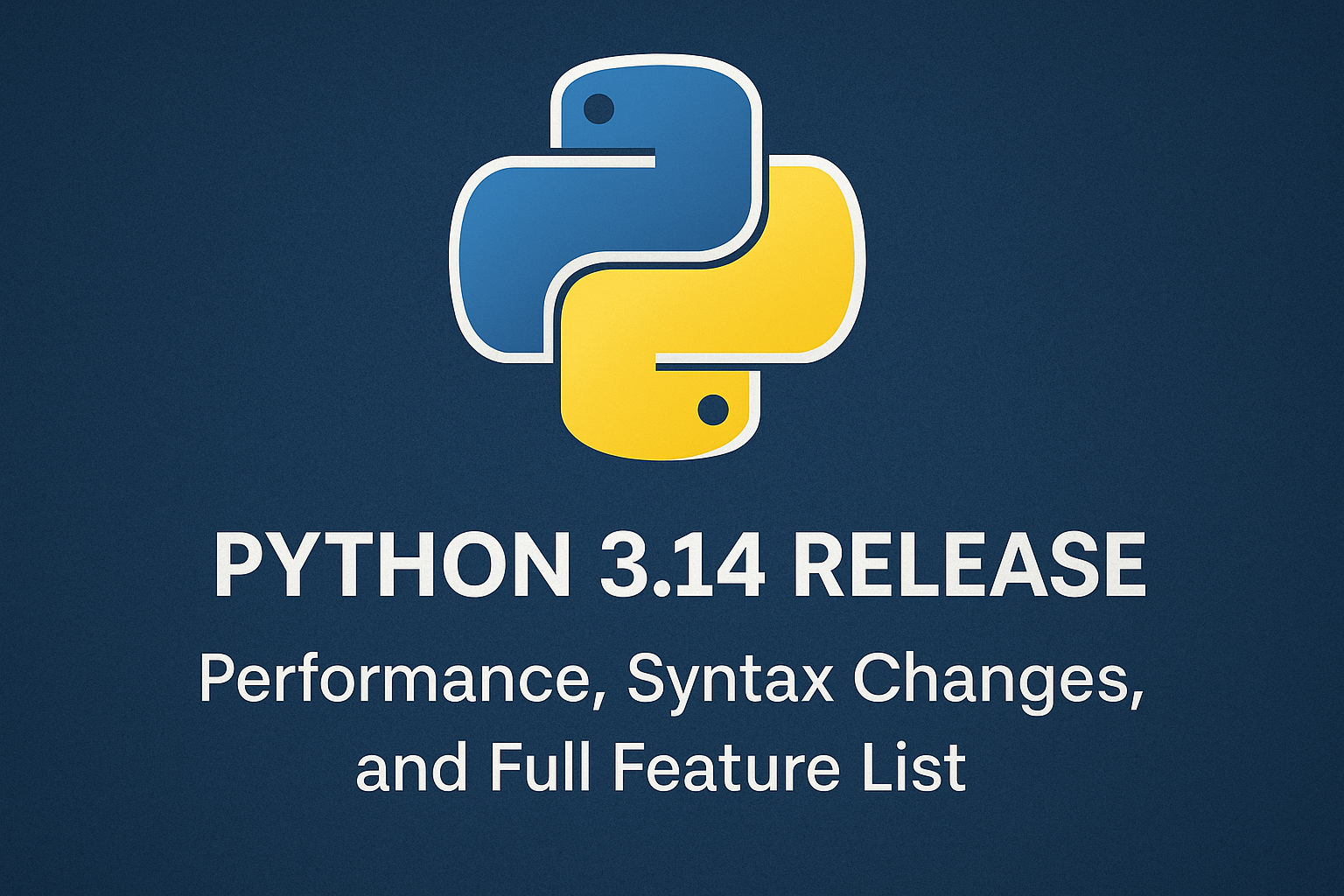Python 3.14 brings meaningful improvements across performance, syntax, standard library enhancement, and introduces future-facing changes in architecture.
This release reflects the Python community’s continued commitment to developer productivity, robustness, and the long-term evolution of the language.
This article is your deep dive into everything new in Python 3.14, featuring hands-on examples and practical use cases.

Performance Improvements
Faster CPython
- Better function call handling
- Optimized reference counting and frame stack
-
Improved memory
allocatorperformance
Comparing Speed
from time import perf_counter
def compute():
return sum(x * x for x in range(1_000_000))
start = perf_counter()
compute()
end = perf_counter()
print(f"Time taken: {end - start:.4f}s")Template Strings (PEP 750)
PEP 750 introduces a new t"" string syntax for custom templating. This is different from f"" strings in that t"" strings allow a custom processor to evaluate and substitute content.
Why it matters:
- Allows libraries to hook into string formatting (e.g., for localization, logging, SQL generation).
- Supports domain-specific template systems.
from string import Template
# Using traditional string.Template
tpl = Template("Hello $name, you are $age years old.")
print(tpl.substitute(name="Alice", age=30))t"" syntax is fully implemented with library support:t"Hello $name, you are $age years old." # Conceptual syntaxAnnotations: PEP 649 Deferred Evaluation (Again)
Python's default handling of function annotations returns to deferred evaluation. This means annotations are stored as strings in __annotations__ and evaluated only when needed.
Why it matters:
- Solves circular import issues.
- Makes introspection safer.
-
No more reliance on from
__future__import annotations.
class Node:
def __init__(self, value: int, next: "Node" = None):
self.value = value
self.next = next
print(Node.__annotations__){'value': 'int', 'next': 'Node'}Zstandard Compression in gzip Module (PEP 784)
Python 3.14 adds support for the Zstandard compression algorithm, which is significantly faster than gzip and offers better compression ratios.
import gzip
data = b"Hello world!" * 100
# Write using zstandard compression
with gzip.open("example.zst", "wb", compresslevel=3, compressalgo=gzip.ZSTD) as f:
f.write(data)
# Read it back
with gzip.open("example.zst", "rb") as f:
print(f.read())Free-Threaded CPython Preview (PEP 703)
Python 3.14 includes experimental support for free-threaded CPython, meaning Python can now run without the Global Interpreter Lock (GIL) in a special build configuration.
Why it matters:
-
True
multithreadingis now closer to reality. -
Potential future standardization in
Python 3.15+.
Note: You must compile CPython with --disable-gil to try this out.
import threading
def worker(n):
for _ in range(n):
pass # CPU-bound task
threads = [threading.Thread(target=worker, args=(10_000_000,)) for _ in range(4)]
for t in threads:
t.start()
for t in threads:
t.join()Error Message Improvements
Python 3.14 enhances error messages with more actionable context. For example, calling a function with the wrong type will show both types and source context.
def square(n: int):
return n * n
square("hello")TypeError: can't multiply sequence by non-int of type 'str'New type.get_type_hints() Behavior
Python 3.14’s get_type_hints() from the typing module now reflects deferred annotations correctly, evaluates forward references lazily, and is consistent across runtime contexts.
from typing import get_type_hints
class Tree:
def __init__(self, left: "Tree", right: "Tree"): pass
print(get_type_hints(Tree.__init__)){'left': <class '__main__.Tree'>, 'right': <class '__main__.Tree'>}New --install-debug-hooks CLI Flag
This new Python command-line flag enables all debug hooks like:
- tracemalloc
- faulthandler
- sys.setrecursionlimit
- warnings filters
python --install-debug-hooks script.pyStandard Library Updates
asyncio
- Improved error messages for TaskGroup
- New asyncio.timeout() context manager behaves more predictably
- More robust subparsers and better required=True support
uuid
- Supports native generation of UUIDv7 and UUIDv8
from uuid import uuid7
print(uuid7()) # Time-based, sortable UUIDSyntax Highlighting in Interactive Shell
Python 3.14 adds syntax highlighting in the REPL (when using the default terminal).
Try it:
python3.14
>>> def greet(name): print(f"Hello, {name}")Experimental Features & Deprecations
Experimental
--disable-gilbuilds__xnew__()slot method prototype (meta-class enhancements)
Deprecated
- Legacy Unicode C APIs
- Old XML modules with weak security guarantees
Final Release Schedule
- Alpha: Complete
- Beta Phase: May 2025
- Final Release (3.14.0): October 2025
Summary Table of Features
| Feature | PEP | Description |
| Template Strings | 750 | t"" syntax for custom templating |
| Template Strings | 649 | Type hints evaluated lazily |
| Zstandard Support | 784 | Faster compression with gzip |
| Free-threaded Python | 703 | GIL-less build (experimental) |
| Error Messages | — | Clearer and more helpful |
| REPL Syntax Highlighting | — | Better shell UX |
| UUIDv7 / UUIDv8 | — | New standard UUID types |
Final Thoughts
Python 3.14 isn't a flashy release — it’s a maturity milestone. It’s the foundation for future parallelism, deep type safety, and a better developer experience.
If you’re maintaining libraries or building production systems, upgrading early gives you:
-
Access to
ZstandardandUUIDv7 - Performance gains
- Type checking improvements
- And a glimpse into Python’s future without the GIL
- 50+ OOPs in Python Interview Q&A with Pro tips for mastering object-oriented concepts with real interview examples.
- 100 Python Interview Q&A – A complete prep guide for freshers and experienced developers alike.
- Python Celery Tutorial with Django – Learn how to run background tasks asynchronously with task queues.
